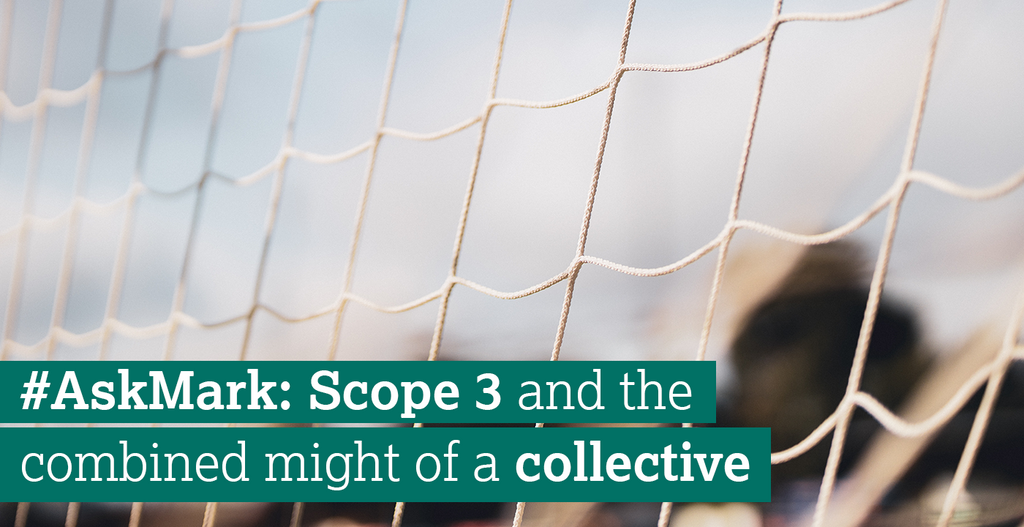#AskMark – Scope 3 and the combined might of a collective

I love the summer because you can invariably count on long days packed with sport. This year is a right feast, with the Euros, Wimbledon, Lions Tour and Olympic Games all packed into a few short weeks.
The thing that I’m always fascinated by is the fantastic team ethics of top-class competitors. Even those in ferociously competitive individual events such as track cycling or athletics are supported by huge networks of backroom staff – such as nutritionists, coaches and physios – to help them get over the line.
Business is the same. Success certainly is never down to one person or idea, but typically is about taking the combined might of a collective to achieve a dream. And it usually requires both a ‘carrot and a stick’ to get the best results.
I make no secret that I want my company, Delphis Eco, to be a winner when it comes to being for the planet and for profit. And to that end we need to lead our entire team including suppliers to become net positive businesses – who care about the planet, people and profit.
We’re already a B-Corp business, which means we can demonstrate a high moral and social compass. Our products are EU Ecolabel certified to prove they do not harm the environment or users and come in 100% recycled plastic bottles. We were founding signatories to the Ellen MacArthur Foundation’s (EMF) Plastics Pact and among the first 100 companies globally to back Global Optimism’s The Climate Pledge. We are also signed up to The Race to Net Zero and The Prince of Wales’s Terra Carta. I am proud of every single initiative and support them passionately.
Being an eco-friendly business can’t be the end of things though. In our drive towards net zero emissions we are already working hard on what’s called our Scope 1 and Scope 2 emissions. Basically, that’s all the greenhouse gas that we produce directly through our facilities, vehicles and energy use. More difficult is Scope 3 – these emissions include all our supply activity, not strictly ours, but directly related to our products.
The letter that landed on the desks of the respective CEOs of our suppliers addressed these emissions. Think of it as a mission statement about how we all move forward to reach a net zero target. It effectively asked them to join our journey and now the ball really is in their court as to how we get there.
We work with a tight selection of businesses and, typically, have chosen those along the way that have similar ideals to us. For example, as I’ve mentioned before, our printer for our labels is the greenest in the world, using eco-friendly inks and cutting-edge processes. So what we are asking of these guys won’t be too much of a struggle, but for others it will be a huge challenge.
You see, what we have suggested is that all our suppliers come on an eco-journey with us, cutting their own carbon emissions and improving the green credentials. We will be conducting audits to see how they are progressing – and holding them to account on promises.
I’ll admit that years ago you could not have expected the type of businesses we work with to have given these issues much thought. But things have moved on. Today, there is no reason why a factory in the Midlands can’t have solar panels on its roof to decarbonise its power needs.
This all sounds a bit draconian and Big Brother, but it really isn’t. The feedback we’ve had so far has been amazingly positive. Now’s the time to realise they are called ‘business partners’ for a reason. The ‘partnership’ comes in the form of a two-way exchange of views and ideas. We are helping with advice and contacts but have also set clear goals about what we expect.
Having a greener and more holistic supply chain requires bold action and may mean some short-term increases in costs. I like the famous IKEA example best – the Swedish giant unilaterally decided to only sell low energy LED bulbs and de-list all non-LED bulbs, which over time completely changed the lighting market. The good news is that LED bulbs have dramatically come down in price and are a normal thing in every home.
We expect to see changes in behaviour across our supply chain, and this will feed further along into thousands of other companies – the suppliers of our suppliers.
It’s all about the action of the collective. Teamwork makes champions.

Leave a comment